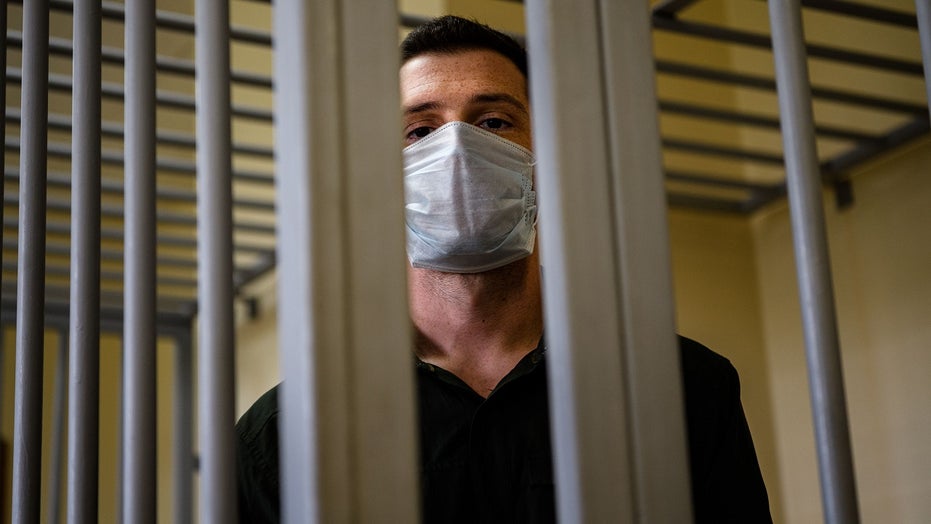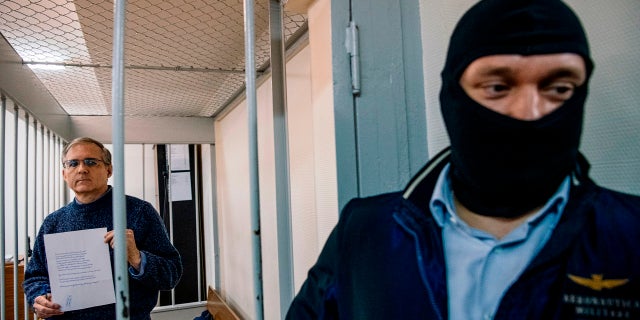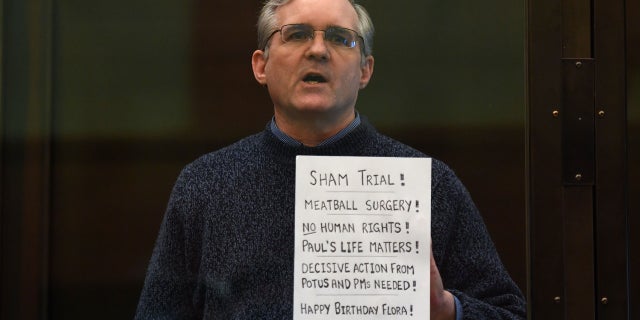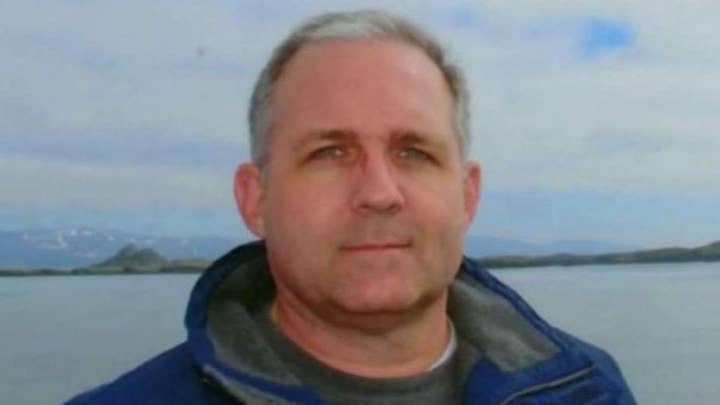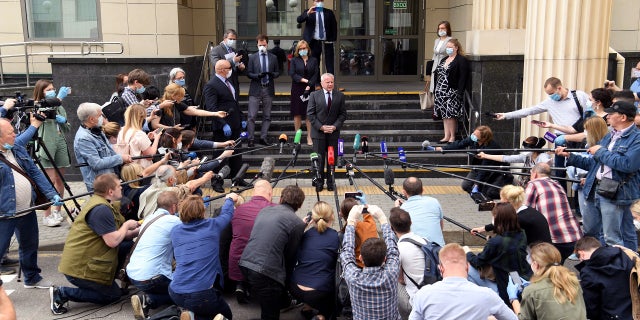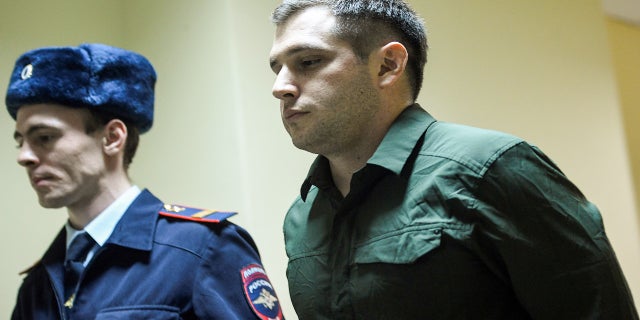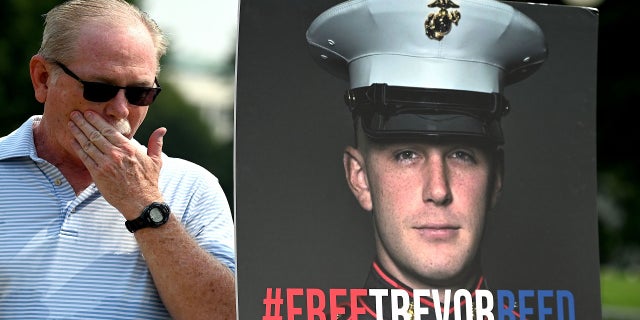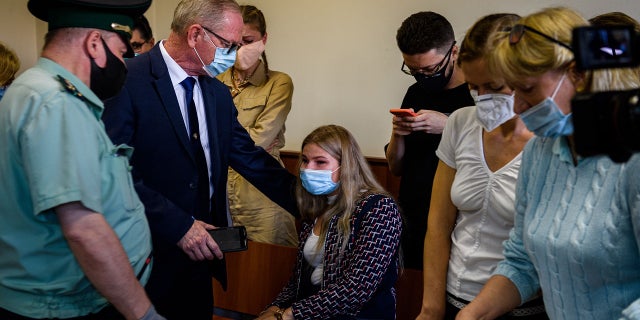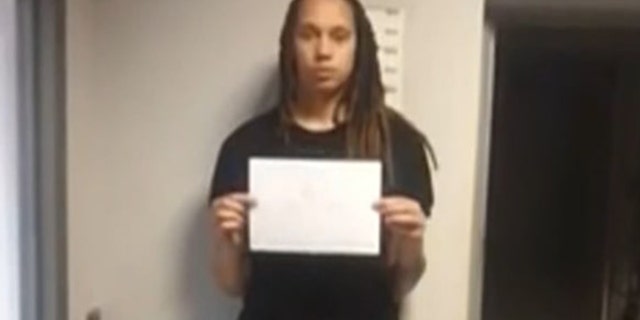Families of Americans detained in Russia amid conflict remain hopeful, despite fears of running out of time

Fox News Flash top headlines for April 7
Fox News Flash top headlines are here. Check out what’s clicking on Foxnews.com.
The families of Americans being held in Russia’s custody say they remain hopeful that the ongoing Russian conflict will not stymie their efforts to bring their loved ones home unscathed, despite their fears of time running out.
Three Americans have been detained by Russian authorities for amounts of time varying from months to years. Nonetheless, the families of Brittney Griner, Trevor Reed and Paul Whelan remain relentless in their pursuit for their safe returns.
“We’ve got to get our son back before he dies, or they put more charges on him.”
Meanwhile, Russia has waged war on Ukraine for more than six weeks, since Kremlin forces first invaded the country on Feb. 24. Since then, at least 1,611 people have been killed and another 2,227 have been hurt, according to the Office of the U.N. High Commissioner for Human Rights on Thursday.
Loved ones of two of the three people spoke with Fox News Digital this week, as they said they will continue to ensure their voices are heard despite the constant Russia news coming out of Ukraine.
PAUL WHELAN
Paul Whelan, a former US Marine accused of espionage and arrested in Russia in December 2018, holds a message as he stands inside a defendants’ cage before a hearing to decide to extend his detention at the Lefortovo Court in Moscow on October 24, 2019.
(Photo by DIMITAR DILKOFF/AFP via Getty Images)
Paul Whelan, now 52, worked in corporate security for about 10 years before his normal life disintegrated at the hands of the Russian government. His job involved him traveling to corporate locations to test the physical security of facilities his company worked with.
He had traveled to Russia a half-dozen times from 2008 and 2018, but his connection to the country “was really just as a tourist,” his twin brother, Paul, told Fox News Digital.
“He wasn’t there visiting any locations. He didn’t work there. He just had made contacts with people who were in Russia,” Whelan said. “He happened to be in Russia, he happened to be in contact with those people, and his life fell apart.”
Paul Whelan, a former US marine accused of espionage and arrested in Russia in December 2018, stands inside a defendants’ cage as he waits to hear his verdict in Moscow on June 15, 2020.
(Photo by KIRILL KUDRYAVTSEV/AFP via Getty Images)
Paul, a U.S. Marine Corps veteran from Michigan, was in Russia to attend a wedding in December 2018 when he was arrested in Moscow. He was accused of espionage and convicted in June 2020, when a Russian court sentenced him to 16 years in prison.
“In hindsight, probably every American going to Russia in the last two or three years should have been worried about their personal security,” Whelan said.
Paul became known for his “feisty” personality and for his unwillingness to crumble to the Russian pressures and has maintained his innocence. In one iconic image from his trial, Whelan, now TKTK, held a white sign that read, among other phrases, “Sham Trial!,” “No Human Rights! Paul’s Life Matters!” “Decisive Action from POTUS and PMs Needed!” and “Happy Birthday Flora,” his beloved dog.
David Whelan said he last spoke to his brother in October 2018, but he and his siblings have remained steadfast in their efforts to bring Paul home safely.
“From the day that he was arrested on Dec. 28, 2018, for about 18 months until he was sent off to Mordovia to the labor colony, none of us were able to speak to him,” Whelan said.
Since around September 2020, Paul has been able to make near-daily calls to his parents and is also allowed to call the U.S. embassy. But there have been times that the family has suddenly lost contact with him, such as in June of this year, when he was “sent to a hospital without requesting it.”
“We have our own suspicions about why,” David said, describing how it was “just before a meeting between President Biden and President Putin.
“And then as soon as he came back from the hospital, he was put in solitary for a month,” David went on. For that almost two-month period, he was unable to make phone calls to our parents.”
David said his brother has tried to be vocal even behind bars about conditions behind bars, “and we’ve tried to help him amplify his voice and presence.”
Whelan said his family has weekly meetings with the U.S. Embassy in Russia, and have continued to do so despite the complications that have arisen from the Russia-Ukraine War. He lauded the work and support of U.S. Ambassador John Sullivan and said the embassy forewarned the Whelan family early on about their concerns regarding Russia’s impending invasion of Ukraine.
“The real issue for us was, if sanctions go into place, what does that do to impact the ability for us to flow money Paul – money that we get put on his phone card, money that we put in his prison account, so he can buy fresh fruits and vegetables,” Whelan explained. “As soon as we saw that these things were potentially coming, even though we didn’t know the day that they would happen, we transferred as much money from his trust account as we could to the U.S. Embassy, and they very quickly tried to move that onto his accounts and were successful.”
US ambassador to Russia John Sullivan speaks with the media outside the Moscow City Court in Moscow on June 15, 2020.
(Photo by KIRILL KUDRYAVTSEV/AFP via Getty Images)
David estimated his brother would have enough money in his inmate account to last him for the next few months. But he said he feared the impacts of any additional sanctions on his brother’s situation and their ability to regularly check up on him.
“I think the biggest concerns right now are the ability for the U.S. Embassy to continue to operate in Moscow. It’s a key ally for us to be able to support Paul,” Whelan continued. “If he can’t communicate with us, can’t receive mail or packages from us, then he really is isolated. He’s an American citizen who doesn’t speak Russian in a Russian labor colony. I think everybody can imagine how awful.”
Whelan said his brother is largely unaware of the ongoing conflict, as he is only exposed to Russian-sponsored television, if at all. Asked how he felt the war could stymie his family’s and the government’s efforts to bring Paul home safely, he said: “It complicates things.”
“I don’t know that Paul’s case is necessarily off the stove,” he went on. “It may just be on the back burner for a while.”
TREVOR REED
WASHINGTON, DC – MARCH 30: Joey Reed and Paula Reed, the parents of Trevor Reed, a U.S. Marine who is currently being detained in a Russian prison, demonstrate in Lafayette Park near the White House on March 30, 2022, in Washington, DC.
(Photo by Anna Moneymaker/Getty Images)
Trevor Reed, a now-30-year-old U.S. Marine Corps. veteran and former presidential security guard, had been living in Russia for the summer of 2019 when was arrested by Russian police and accused of assaulting a police officer. He had been celebrating in a park with his longtime Russian girlfriend and her colleagues at the time, his father, Joey Reed, told Fox News Digital.
“He was extremely intoxicated because they’d been to a party for her law firm in a park,” he explained. “Everyone knew him because he’d been there all summer in and out of the office all day long.”
At the time, Reed had been taking Russian language classes for an international studies degree through the University of North Texas, his father said.
“He got sick. They stopped to let him get out … They’re kind of corralling him and, one of the people called the police,” Reed went on. “From then on, everything else is a lie, based on witnesses, based on video, based on expert witnesses who examined what little evidence that Russians allowed in courtroom.”
Police officers escort US ex-marine Trevor Reed, charged with attacking police, into a courtroom prior to a hearing in Moscow on March 11, 2020.
(Photo by ALEXANDER NEMENOV/AFP via Getty Images)
Reed’s girlfriend and her colleagues followed police, who had taken Reed into custody, to the police station, where they were told to return at 9 a.m. to pick him up after he had sobered up.
“He should have never gone to the police station under Russian law. He was supposed to have been taken to a hospital,” Reed said.
When the woman returned to the police station with her mother at 9 a.m., they were greeted by agents from the Federal Security Service of the Russian Federation (FSB).
“She was frantic,” Reed said. The concerned parents called the U.S. Embassy and ultimately hired the best lawyers they could.
Russian law enforcement accused Reed of drunkenly grabbing an officer’s arm and elbowing another while inside a police car on the way to the station.
Joe Reed, the father of former US Marine Trevor Reed, stands next to a placard of his son outside the US Capitol in Washington, DC, on July 29, 2021, during a press conference.
(Photo by JIM WATSON/AFP via Getty Images)
Within months, the Reeds’ lawyers, including one who was a retired judge, told them: “Something’s not right here.”
Reed said he later heard from top government officials, “We’re being told from the top people of Moscow to keep the heaviest charges on him and make sure that he’s convicted.”
At his arraignment, Reed told the judge: “Your honor, I don’t remember anything that happened. I would never intentionally try and hurt a police officer. All my friends are police officers.” His father said. “He said, ‘If you can show me that I did this, I’ll plead guilty … and beg for mercy from the court.”
Following a public trial, Reed was convicted in July 2020 of assaulting police officers and was sentenced to 19 years in prison.
Much like the Whelan family, the Reeds meet with the U.S. government once a week to discuss their son’s case. Joey Reed said they work with people who are assigned to nothing but handling their son’s case. He said they also speak with the Whelan family regularly.
Alina Tsybulnik (C), girlfriend of US ex-marine Trevor Reed, charged with attacking police, reacts during verdict hearing at Moscow’s Golovinsky district court on July 30, 2020.
His time in Russian prisons and labor camps has been concerning, the family said.
“He was essentially in solitary confinement, I believe, for over a year in a pretty bad prison,” Reed said. “Once he got to the labor camp … they would wake him up every hour. You know, they were punishing him for different things.”
He added: “My son saw the sun maybe a dozen times in two years.”
Trevor pushed back against Russian authorities’ efforts to make him work at the labor camp, telling them: “I’m not working for you. You’ve taken me hostage, and I’m not going to make stuff for you to make money on.”
Absent of a stricter housing facility within the camp, authorities have begun to accuse Reed of false violations that land him in solitary confinement.
US ex-marine Trevor Reed, charged with attacking police, stands inside a defendants’ cage during his verdict hearing at Moscow’s Golovinsky district court on July 30, 2020.
(Photo by DIMITAR DILKOFF/AFP via Getty Images)
“They send you to solitary confinement, basically because you’re refusing to work. And they make up reasons for it. But the real reason is you’re refusing to work,” Reed said. “So, my son spent the first seven months there, basically in solitary confinement for 14 to 21 days at a time, and then they let him out for two and then they put him back out on more false charges.”
Trevor is sporadically able to make phone calls and communicate with his girlfriend or the embassy, but the correspondence is irregular and infrequent, Reed said.
“Our only communications for 232 days were through his girlfriend and occasionally he would call his attorneys in Moscow,” Reed went on. “But they would not let him call the embassy or us.”
Authorities further claimed that Trevor did not have the necessary calling card, then didn’t have enough money on the card to make calls, and then would only allow him to speak on the phone in Russian.
Trevor’s situation has grown recently concerning in recent months after he grew ill with active tuberculosis and then began continuously coughing up blood. Reed said Russian authorities have recently refused to re-test Reed for active tuberculosis, despite Russian-sponsored media reports that have claimed that they did so several times.
He was hospitalized for 10 days before he was returned to the camp and placed in solitary confinement once again.
“He’s been sick almost the whole time he’s been there,” Reed said. “You’re not supposed to be put in solitary confinement if you’re sick or injured, and he’s both.”
On March 28, Trevor began a hunger strike in protest of his condition, prompting his concerned parents to travel from their home in Texas to Washington, D.C. to further embark on their media campaign in support of their son.
Four days after the hunger strike began, Trevor was back in a hospital, where he called his girlfriend and said he had lost seven pounds since it started. Despite that the hospital usually provides Reed with opportunities to make outgoing calls, Trevor’s girlfriend has not heard from him since.
On Thursday, the family posted on a Twitter account “Free Trevor Reed,” writing: “To the Russian Govt: Please let us speak to our son so we know he is alive and his condition.”
Earlier this week, the family said they had not received proof that their son was alive in almost a week.
“Our son is out of time,” the family wrote. “We are urgently calling on the Russian government to provide proof-of-life and resume allowing Trevor to call us. Our son is critically ill – this is not the time for cruelty for cruelty’s sake.”
Reed told Fox News Digital that Reed’s condition is “getting worse and worse and we’re able to help less and less.”
“We’re just afraid that we’ve got to get our son back before he dies or has more charges put on him,” Reed said. “He’s innocent.”
BRITTNEY GRINER
Brittney Griner is pictured in an undated photo after her arrest.
(Russian State TV)
Brittney Griner became most recent American to be detained by Russian authorities when she was arrested in February at a Moscow airport, where law enforcement searched her luggage and allegedly found vape cartridges that contained a cannabis-derived oil. She is believed to be detained in a facility near Moscow, U.S. State Department officials have said.
At the time, Griner, a 31-year-old WNBA star with the Phoenix Mercury, was trying to return to the U.S. during a break in the Russian league.
Griner is serving pretrial detention until May 19, The Associated Press reported, and faces up to 10 years in prison.
U.S. State Department spokesperson Ned Price has said the U.S. “will do everything we can to see that she is treated fairly throughout this ordeal,” according to the report.
Griner’s wife did not respond to Fox News Digital’s request for an interview. Multiple reports have indicated people close to her have chosen to stay quiet to prevent any hindrances in Griner’s case.
Source: Read Full Article
